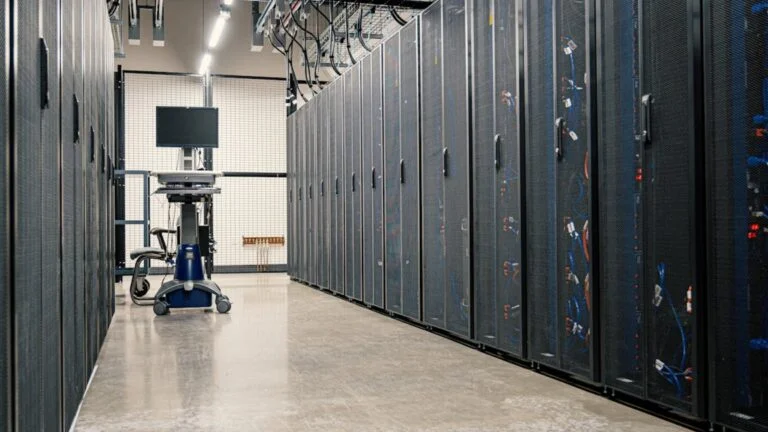Shell : Between historical challenges and the climate imperative
In the face of major climate challenges and the rapid evolution of the energy sector, companies must today double their efforts and agility to successfully carry out their transformation. Shell, a global leader for over a century, perfectly represents this large-scale challenge: reinventing its industrial model while responding to the climate emergency. To achieve this, Shell has chosen Nvidia, a strategic technology partner recognized for its leadership in artificial intelligence (AI) and high-performance computing (HPC), to significantly accelerate its energy transition.
Shell has set a clear roadmap: reduce its operational emissions by 50% by 2030 and reach carbon neutrality by 2050. To meet this ambitious commitment, the company is compelled to radically transform its legacy activities, optimize its existing processes, and rapidly design sustainable infrastructure to meet the energy needs of tomorrow.
Critical challenges faced by Shell : the urgency to accelerate
Shell operates in a complex sector where every mistake comes at a high cost both economically and environmentally. The company faces three major challenges :
- First, the exploration and production of hydrocarbons require precise mapping of underground reserves, traditionally carried out through slow, costly, and often error-prone human methods. These manual interpretations, in addition to being time-consuming, rely heavily on human experience, making the task long, expensive, and imprecise.
- Second, the design of sustainable infrastructures such as carbon capture units or biofuel production sites has historically depended on extremely lengthy simulations. Fluid dynamics, for instance, typically requires several weeks of computation before delivering actionable results, which significantly slows down the launch of new projects.
- Finally, one of the major challenges in the energy sector lies in preserving and transmitting internal expertise. Shell, with over a century of history, holds valuable industrial know how yet much of it is scattered. Effectively passing on this expertise to new generations remains a complex task.

The strategic partnership with Nvidia : accelerating through AI
To overcome these challenges and accelerate its climate ambitions, Shell has established a strong technology partnership with Nvidia. Leveraging the power of Nvidia DGX A100 GPUs, Shell is now able to automate and speed up critical processes.
According to Nvidia, the partnership has enabled Shell to automate the detection of oil and gas reservoirs, drastically reducing human intervention and significantly accelerating the process. Industrial fluid dynamics (CFD) simulations have been cut down from two weeks to just five days thanks to these new HPC systems. The development cycle for innovative new materials has also been shortened by a factor of 2.5, greatly accelerating innovation workflows.
(Source : Nvidia Success Story – Shell)

Limits and risks : do not underestimate the realities on the ground
While this case study may seem ideal at first glance, several important aspects are not fully disclosed by Nvidia or Shell. For instance, the actual time-to-market for solutions developed using these technologies is not specified. Additionally, the scale of the initial investment remains confidential, as does the exact cost of relying on specialized external expertise often rare and expensive. In other words, the return on investment (ROI) remains a key metric that must be closely monitored.
Risks related to the confidentiality of critical data especially industrial and strategic also need to be carefully managed. Sharing such data with external partners requires particularly strict governance to avoid any leaks or breaches.
Lastly, the heavy technological reliance on a single provider could lead to a major long-term operational risk (“vendor lock-in”), limiting Shell’s future flexibility in adapting or evolving its technology choices.
Lessons learned : realistic inspiration for the entire energy sector
This collaboration clearly highlights the strategic value of integrating artificial intelligence into the energy transition. However, several key lessons must be learned by industry players:
First, AI is not a silver bullet, but a powerful strategic lever that must be tightly integrated into existing business processes. Second, rigorous data management is essential both to maximize its value and to ensure its security and confidentiality. Finally, a balanced approach to technology partnerships is crucial to ensure long-term sustainability, avoid excessive dependency, and maintain full control over future directions.

Conclusion : an inspiring model, but one that needs to be adapted
The partnership between Shell and Nvidia is an inspiring example for any company looking to accelerate its transformation through AI. However, it also underscores the importance of being clear-eyed about the required investments, project timelines, and the inherent risks linked to technological dependency and data security.
In short, take inspiration from this exemplary case but adapt it to your operational reality, your specific constraints, and be especially careful to accurately measure your return on investment (ROI).
(Source: Nvidia Success Story – Shell)
About the author

Ismail has 15 years of experience in IT and digital consulting. He spent nearly 7 years at Gartner. He has supported innovative startups in their growth strategy and worked with CIOs of large groups on their digital transformation. In 2021, Ismail founded Hubadviser to help CIOs challenge their vision with top-level experts.

